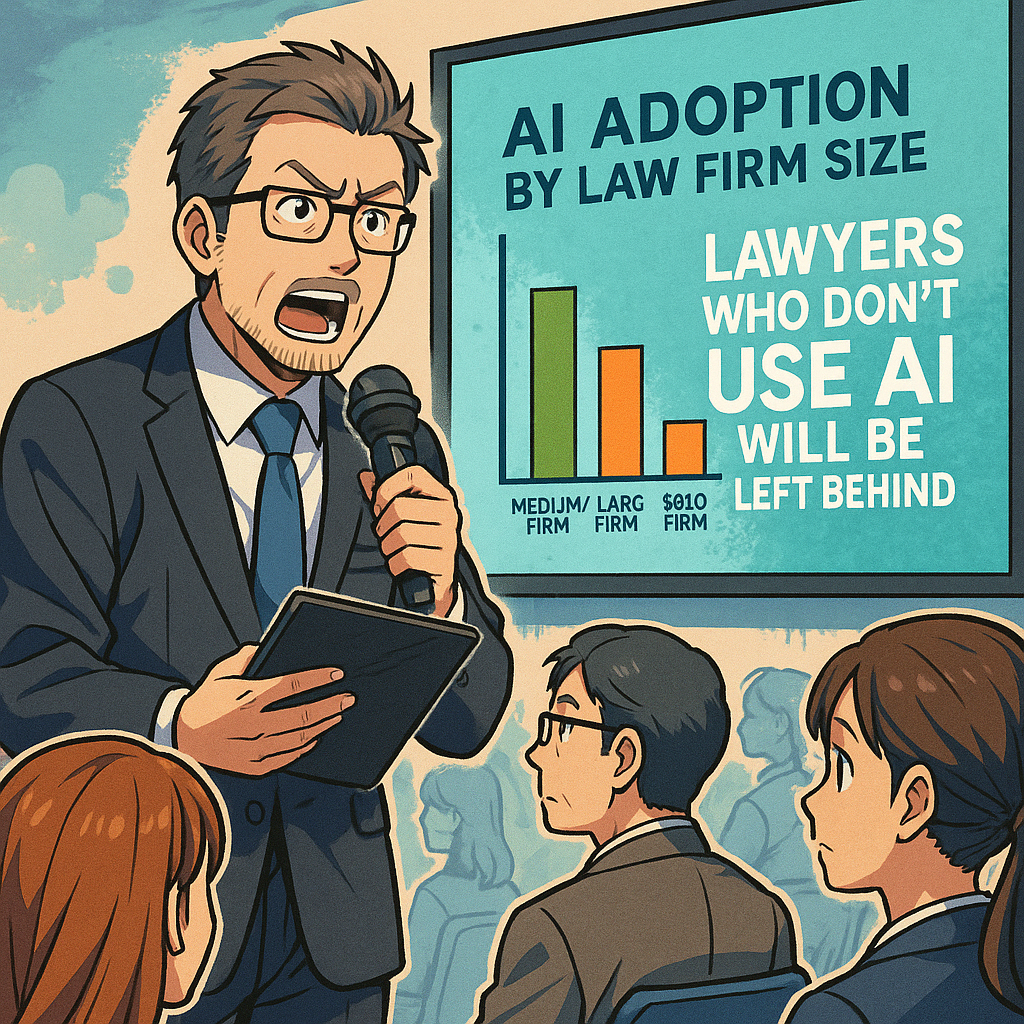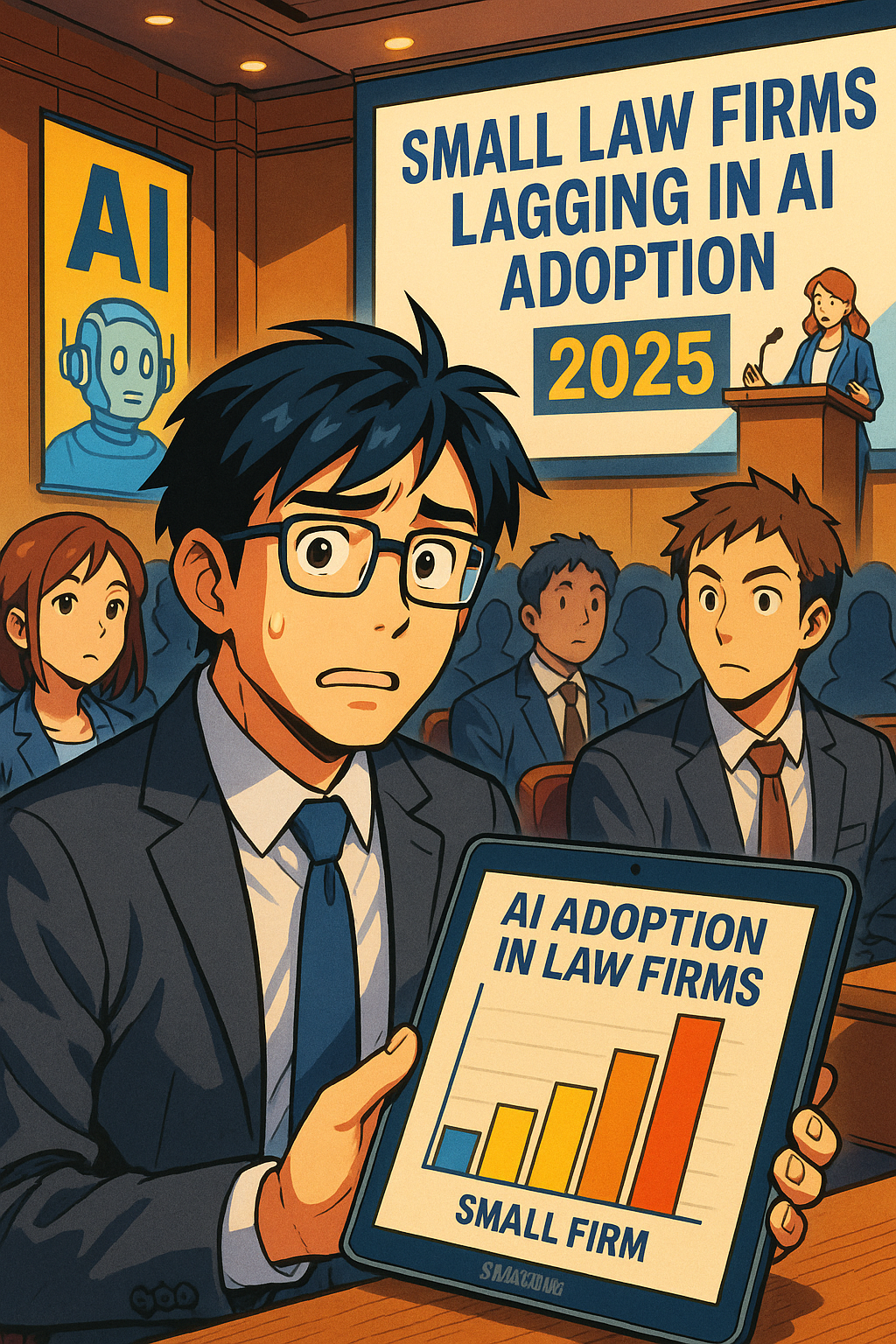🚨 BOLO: Solo and Small Law Firms Lag in AI Adoption: Key Insights from ClioCon 2025 and Steps Forward
/solos & Small law firms risk falling behind in AI adoption race.
The most recent data released at ClioCon 2025 in Boston reveals a significant gap between solo/small law firms and their medium to large counterparts in adopting artificial intelligence (AI) tools for legal practice. According to Clio’s research, small and solo practitioners are much less likely to integrate AI into their workflows, a disparity that is becoming increasingly problematic as AI transforms efficiency, research, and client service across the legal industry. This “AI divide” is not just theoretical; podcasts like our The Tech-Savvy Lawyer.Page Podcast (for example episode #65: Technologies impact on access to justice with Bridget Mary McCormick) and related The Tech-Savvy Lawyer.Page blog articles have sounded the alarm for over a year: lawyers who do not adapt to AI risk being left behind in a rapidly evolving market for legal services. Fortunately, there are tangible, accessible steps every legal practitioner can take now to bridge this technology gap—and safeguard their practice for the future.
Understanding the AI Adoption Gap: Insights from ClioCon 2025
Clio’s report, highlighted at this year’s ClioCon, delivers a sobering visualization of AI adoption in law. The data show that while only 15% of medium and large firm lawyers report “not adopting AI at all,” a striking 28% of solo and 33% of small firm lawyers report having never integrated AI into their practice. Another 50% of solos and 47% of small firm practitioners indicate only “minimal adoption,” compared to just one-quarter of their counterparts in larger firms. By contrast, “wide adoption” and “universal adoption” rates are as much as four to eleven times higher in larger organizations.
These statistics reveal two concurrent problems: first, access to new tools is bottlenecked in smaller organizations; second, the growth curve for AI in solo and small firms is lagging at precisely the moment legal technology is entering mainstream professional use. The drivers vary—budget, uncertainty, and lack of technical skills are chief among them—but the consequences are clear: smaller firms risk both efficiency and competitiveness gaps.
The message echoed throughout ClioCon (and reiterated in this blog and accompanying podcast) is clear: this lag in adoption is not sustainable. As AI continues to automate research, draft pleadings, predict case outcomes, and streamline workflow, firms that do not embrace innovation will increasingly lose business to those that do.
📢 “Lawyers Who Don’t Use AI Will Be Left Behind”: The Industry’s Stark Warning!
CLIO’s report reflects that solo and small firms need to catch up in the ai game or risk getting left behind!
The notion that “lawyers who don’t use AI will be left behind by those who do” is no longer hyperbole. The Tech-Savvy Lawyer.Page blog and podcast, notably in discussions with Caroline Mary McCormack and other legal industry experts, has emphasized that AI integration is shifting from competitive advantage to core competency. The 2025 consensus is that AI is not intended to replace lawyers, but instead to complement human judgment and expertise. This means that practices which fail to engage with AI are forgoing both productivity gains and enhanced client service—and thus, client retention.
Legal blogs, including recurring pieces on The Tech-Savvy Lawyer.Page, have grounded this warning in real-world examples. Larger firms have used AI to automate due diligence, rapidly analyze discovery documents, and predict litigation outcomes with better-than-human accuracy in some domains. Meanwhile, the administrative burden and antiquated workflows of smaller firms are growing more visible to prospective clients, who often now expect their counsel to demonstrate modern, technology-driven efficiency.
In short, inaction is fast becoming a business risk for smaller practices. Adopting AI is not merely about adopting new gadgets; it is about future-proofing both the services offered and the sustainability of the legal practice.
Actionable Steps: How Small Firms and Solos Can Start Closing the AI Gap
Recognizing the gap is only the first step. The next is to implement an actionable, realistic strategy for catching up. Fortunately, integrating AI does not require massive budgets or advanced programming knowledge. Based on guidance from both Clio’s educational resources and practical steps outlined in The Tech-Savvy Lawyer.Page podcast and blog, solo and small firm practitioners should focus on the following foundational actions:
Start by identifying repetitive, low-impact tasks that consume hours but require little legal judgment—such as document review, timekeeping, scheduling, or initial client intake. Modern AI-powered tools are now built to integrate seamlessly with popular law practice management systems (including Clio’s own suite), allowing even non-technical users to automate these functions with a minimal learning curve.
Next, take advantage of freely available online trainings, webinars, and tutorials specifically created for legal professionals. Both Clio and a number of technology-forward law blogs maintain up-to-date, curated lists of beginner resources. Invest an hour each week to build digital literacy and track the latest developments in legal AI.
Solo attorneys and small firms should worry as AI gap widens across legal industry.
Lawyers can also begin exploring AI-powered research tools (such as intelligent legal search engines and brief analyzers) to streamline case preparation and minimize time spent on routine research. Most vendors offer trial periods or special pricing for small firms, making it easy to test capabilities without significant upfront investment.
Finally, network with other technology-forward law practitioners, locally or through online communities, to share experiences and vet the practical impact of various AI tools. Peer-to-peer mentoring reduces adoption friction and accelerates both confidence and competence.
Final Thoughts: The Time to Act Is Now!
The clear message from ClioCon 2025—and across the legal technology community—is that the window to “wait and see” on AI has closed. Solo and small firm lawyers are not being left behind by choice; but without targeted action, the resource and competitiveness gap will persist or widen. The advantages that AI delivers—efficiency, accuracy, and superior client service—are no longer the exclusive province of large organizations. Practical, affordable AI tools are now accessible to all, provided practitioners proactively invest the time to explore and integrate them. Whether starting with calendar automation, document management, or legal research, every step toward AI integration is a step toward a more sustainable, resilient, and client-driven practice.












